This list of 13 people was compiled by The Leadership Newpaper and there are 4 women on the list. Find our it was reported below.
“Since inception of Nigeria as an independent geopolitical entity we have had Nigerians who have distinguished themselves in various areas of human endeavour through their outstanding commitment to what they were or are still into, and have either affected lives or attracted attention beyond the shores of this country, winning international accolades.
Ahmadu Bello (Knight of the British Empire)
![a0bello[1]](http://abovewhispers.com/wp-content/uploads/2016/06/a0bello1.jpg)
Sir Ahmadu Bello KBE (June 12, 1910 – January 15, 1966) was a Nigerian politician who was the first and only premier of the Northern Nigeria region. He also held the title of Sardauna of Sokoto. Bello and Abubakar Tafawa Balewa were major figures in Northern Nigeria pre-independence politics and both men played major roles in negotiations about the region’s place in an independent Nigeria. As leader of the Northern People’s Congress, he was a dominant personality in Nigerian politics throughout the early Nigerian Federation and the First Nigerian Republic.
Bello was made a Knight of the British Empire (KBE) by Queen Elizabeth II of England in 1959.
Abubakar Tafawa Balewa (Knight Commander of the Order of the British Empire)
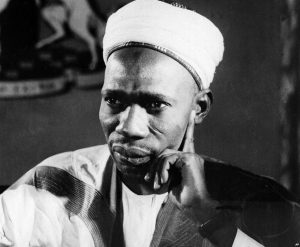
Alhaji Sir Abubakar Tafawa Balewa, KBE (December 1912 – January 15, 1966) was a Nigerian politician from Bauchi, and the only prime minister of an independent Nigeria. Originally a trained teacher, he became a vocal leader for Northern interest as one of the few educated Nigerians of his time. He was also an international statesman, widely respected across the African continent as one of the leaders who encouraged the formation of the Organization of African Unity (OAU). Nicknamed the Golden Voice of Africa because of his oratory, he stands one of the only three National Heroes of the Nigerian Nation.
In January 1960, Balewa was knighted by Elizabeth II as a Knight Commander of the Order of the British Empire (KBE). He was awarded an honorary doctorate from the University of Sheffield in May, 1960.
In 1957, Balewa was appointed Chief Minister, forming a coalition government between the NPC and the National Council of Nigeria and the Cameroons (NCNC), led by Nnamdi Azikiwe. He retained the post as Prime Minister when Nigeria gained independence in 1960, and was re-elected in 1964.
He was overthrown and murdered in a military coup on January 15, 1966, as were many other leaders, including his old companion, Ahmadu Bello. Today, his portrait adorns the five Naira Note. The Abubakar Tafawa Balewa University in Bauchi is named in his honour.
Abubakar Gumi (King Faisal International Prize)
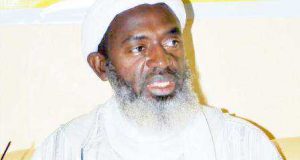
Abubakar Gumi (COFR) (1922-1992) was an outspoken radical Islamic scholar and Grand Khadi of the Northern Region of Nigeria (1962-1967), a position which made him a central authority in the interpretation of the Sharia legal system in the region. He was a close associate of Ahmadu Bello, the premier of the region in the 1950s and 1960s and became the Grand Khadi partly as a result of his friendship with the premier. In 1967, the position was abolished.
Apart from his national award, he received the King Faisal International Prize from Saudi Arabia for his translation of the Quran into Hausa language.
At a time in his political career, after his closest political ally, Sir Ahmadu Bello and Sadauna of Sokoto had exited finally by the January, 1966 coup that brought the First Republic to an abrupt end, he became a supporter of women’s rights to vote.
Wole Soyinka (Nobel Prize for Literature)
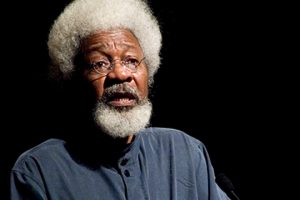
Akinwande Oluwole Babatunde Soyinka (born 13 July, 1934), popularly called Wole Soyinka is a Nigerian playwright and poet. He was awarded the 1986 Nobel Prize in Literature, the first African to be honoured in that category.
After study in Nigeria and the UK where he bagged his BA in Literature at the University of Leeds, he worked with the Royal Court Theatre in London. He went on to write plays that were produced in both countries, in theatres and on radio. He took an active role in Nigeria’s political history and its struggle for independence from Great Britain.
Soyinka was awarded the Nobel Prize for Literature in 1986, becoming the first African laureate. He was described as one “who in a wide cultural perspective and with poetic overtones fashions the drama of existence”.
Philip Emeagwali (Gordon Bell Prize winner)
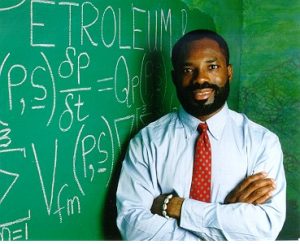
Philip Emeagwali (born in 1954) is an Igbo Nigerian-born engineer and computer scientist/geologist who was one of two winners of the 1989 Gordon Bell Prize, a prize from the Institute of Electrical and Electronic Engineers (IEEE), for his use of a Connection Machine supercomputer to help analyse petroleum fields. He performed the world’s fastest calculation at 3.1 billion calculations per second.
This calculation was remarkable not only because it was twice as fast as the previous world record, but also because of the method used to achieve this phenomenal task. Rather than use a multimillion dollar supercomputer, Emeagwali used the Internet to access 65,536 small computers simultaneously (called massively parallel computers).
This technology is revolutionising the oil industry as it is used to help simulate how to recover oil from oilfields, thus helping oil producing nations to efficiently extract more oil and increase their oil revenues. It is also applicable to the field of meteorology as it can be used to help predict weather patterns for the next 100 years forecast.
Nwankwo Kanu (Olympic Football Gold Medalist)
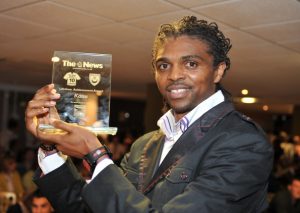
Nwankwo Kanu (born 1 August, 1976), popularly called Papilo, perhaps owing to his willowy physique, is a retired Nigerian footballer of Igbo extraction who played as a forward. Kanu’s magnum opus was his leading Nigeria’s U-23 football team (otherwise referred to Dream Team I) to victory at the 1996 summer Olympics thereby becoming the winner of the Olympic soccer gold medal of that year. He was a member of, and later captained, the Nigerian national team, the Super Eagles, for 16 years from 1994.
Kanu’s international success includes a FIFA under-17 World Cup title in 1993 and the 1996 Olympic football gold medal, UEFA Champions League medal among several others. He is also a UNICEF Goodwill Ambassador.
He announced his retirement from international football at the 2010 World Cup in South Africa.
Chioma Ajunwa (Olympic Gold Medalist)
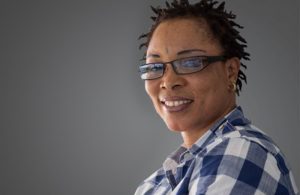
Chioma Ajunwa-Opara, popularly known as Chioma Ajunwa, is a Nigerian former athlete who specialised in the long jump. Ajunwa hails from Ahiazu Mbaise in Imo State. After various setbacks in her career, she achieved fame when she became the first athlete in her country to win an Olympic gold medal at the 1996 Summer Olympics in Atlanta, and to date remains Nigeria’s only individual Olympic gold medalist. Ajunwa is also an officer with the Nigerian Police Force.
As a professional sportswoman, Ajunwa originally played football for the Nigerian women’s team and was a member of The Falcons during the Women’s World Cup in 1991.
Ajunwa performed as a track and field athlete and specialised in 100m, 200m and long jump, eventually competing at the African Championships in 1989 and the All Africa Games in 1991 where she won the gold medals in the long jump.
Agbani Darego (Miss World)
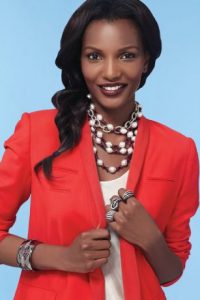
Ibiagbanidokibubo ‘Agbani’ Asenite Darego, popularly called Agbani Darego, (born December 22, 1982) is a model, best known as the first black African to be crowned Miss World in 2001. Darego hails from Abonnema, Rivers, and was born into a family of eight children.
Darego managed to divide her time between her official duties with her education at the University of Port Harcourt where she was studying Computer Science, and she represented Nigeria in the 2001 Miss Universe competition, held in Bayamón, Puerto Rico. She placed among the top 10 semi-finalists, finishing seventh. She was the only black semi-finalist that year – and the only finalist to wear a maillot swimsuit. In November 2001, Darego was crowned Miss World, beating Miss Scotland and Miss Aruba in the final round.
Chimamanda Ngozi Adichie (Commomwealth Writers’ Prize for Best Book/ Orange Prize for Fiction)
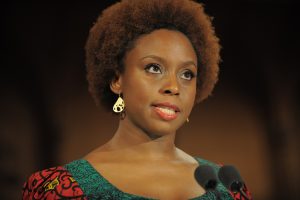
Chimamanda Ngozi Adichie (born September 15, 1977) is a writer whose first two novels won literary awards. She is a native of Abba, in Njikoka Local Government Area of Anambra State. At the age of 19, Adichie left Nigeria and moved to the United States for college and studied at Drexel University in Philadelphia. In 2003, she completed a master’s degree in creative writing at Johns Hopkins University in Baltimore. In 2008, she received a Master of Arts in African studies at Yale University. Chimamanda is a 2008 MacArthur Fellow. Her first novel, Purple Hibiscus, was published in 2003 and won the 2005 Commonwealth Writers’ Prize for Best First Book. Her second novel, Half of a Yellow Sun, named after the flag of the short-lived Biafran nation, is set before and during the Biafran War. It was published by Fourth Estate in the UK and by Knopf/Anchor in 2006 and was awarded the 2007 Orange Prize for Fiction.
Mike Adenuga (African Entrepreneur of the Year)
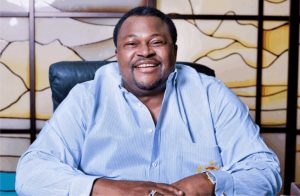
Michael Adeniyi Agbolade Ishola Adenuga Jr (born 29 April 1953), popularly called Mike Adenuga, is a Nigerian business tycoon, and the second richest person in Nigeria. His company, Globacom is Nigeria’s second-largest telecom operator, and also has a presence in Ghana and Benin. He also owns stakes in the Equitorial Trust Bank and the oil exploration firm, Conoil (formerly Consolidated Oil Company). Forbes has estimated his net worth at $3.2 billion as of September 2015 which makes him the second wealthiest Nigerian behind Aliko Dangote, and the sixth richest person in Africa.
In August of 2007, Adenuga was named the African Telecoms Entrepreneur of the Year for his courageous and rapid investment in the telecom sector. The recognition was given at the 2007 maiden Africa Telecoms Award event held in Lagos and witnessed by prominent Africans.
Oluwatoyosi Ogunseye (Knight International Journalism Award)
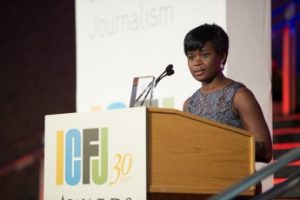
Who says there are no competent journalists of international standard in Nigeria?
Oluwatoyosi Ogunseye, a Mandela Washington Fellow from Nigeria, recently received the 2014 Knight International Journalism Award by the United States-based International Centre for Journalism (ICFJ). This prestigious award recognises outstanding investigative journalistic ability that makes a difference in the lives of people around the world.
Her stories are not just award-winning — they have catalysed positive change. In one of such, she published a piece on infant mortality rates at a top hospital in Lagos that pressured the hospital to purchase more incubators for high-risk new-borns.
Recently, March 9, 2016 to be precise, she received the Presidential Precinct’s inaugural Young Leader Award.
The Presidential Precinct, which announced the creation of the Young leader Award in January 2016 presented her with it in Charlottesville, Virginia.
Ogunseye is a two-time winner of the CNN/Multichoice African Journalists Award and several other national and international awards.
Aliko Dangote (African Person of the Year)
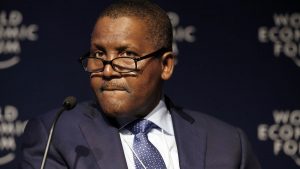
Aliko Dangote GCON (born 10 April 1957) is a Nigerian billionaire, who owns the Dangote Group. The company operates in Nigeria and other African countries, including Benin, Ethiopia, Senegal, Cameroon, Ghana, South Africa, Togo, Tanzania, and Zambia. As of January 2015, he had an estimated net worth of US$18.6 billion.
Dangote was named as the Forbes Africa Person of the Year 2014. In 2013, Alhaji Dangote and six other prominent Nigerians were conferred Honorary Citizenship of Arkansas State by Governor Mike Beebe who also proclaimed May 30 of every year as Nigeria Day in the US.
Oba Otudeko (Africa CEO of the Year)
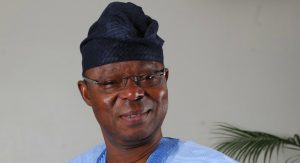
Ayoola Oba Otudeko, CFR (born, August 18, 1943) is a Nigerian investor and entrepreneur whose domestic and foreign interests cut across diverse sectors of the economy. The Nigerian business mogul, who is the chairman of Honeywell Group beat seven other finalists, including Africa’s richest man, Aliko Dangote, to clinch the coveted prize of Africa Chief Executive (CEO) of the Year (2016) at a meeting of more than 800 chief executives across the continent held in Abidjan, the capital of Cote d’Ivoire.
Set up in partnership with the AfDB, the Africa CEO Forum is an event organised jointly by Groupe Jeune Afrique, publisher of Jeune Afrique and The Africa Report, and Rainbow Unlimited, a Swiss company specialising in organising economic promotion events’


One Response
Nigeria is blessed with men and women of great strength and courage. Men with undivided Vision. Once the goal is single – nothing is unachievable. #BasedOnBelief